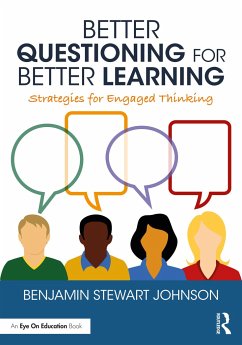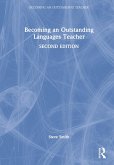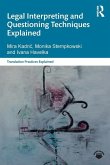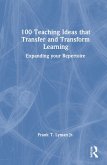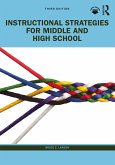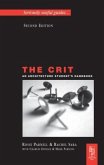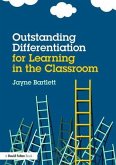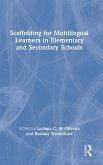- Broschiertes Buch
- Merkliste
- Auf die Merkliste
- Bewerten Bewerten
- Teilen
- Produkt teilen
- Produkterinnerung
- Produkterinnerung
Learn how to ask deeper questions and develop better questioning habits with this important resource. Author Ben Johnson takes you step-by-step through the key considerations and brain-based research to keep in mind when developing questions.
Andere Kunden interessierten sich auch für
![Becoming an Outstanding Languages Teacher Becoming an Outstanding Languages Teacher]() Steve SmithBecoming an Outstanding Languages Teacher180,99 €
Steve SmithBecoming an Outstanding Languages Teacher180,99 €![Legal Interpreting and Questioning Techniques Explained Legal Interpreting and Questioning Techniques Explained]() Mira KadricLegal Interpreting and Questioning Techniques Explained41,99 €
Mira KadricLegal Interpreting and Questioning Techniques Explained41,99 €![100 Teaching Ideas that Transfer and Transform Learning 100 Teaching Ideas that Transfer and Transform Learning]() Frank T. Lyman Jr.100 Teaching Ideas that Transfer and Transform Learning180,99 €
Frank T. Lyman Jr.100 Teaching Ideas that Transfer and Transform Learning180,99 €![Instructional Strategies for Middle and High School Instructional Strategies for Middle and High School]() Bruce E. Larson (USA Western Washington University)Instructional Strategies for Middle and High School68,99 €
Bruce E. Larson (USA Western Washington University)Instructional Strategies for Middle and High School68,99 €![The Crit: An Architecture Student's Handbook The Crit: An Architecture Student's Handbook]() Rosie ParnellThe Crit: An Architecture Student's Handbook30,99 €
Rosie ParnellThe Crit: An Architecture Student's Handbook30,99 €![Outstanding Differentiation for Learning in the Classroom Outstanding Differentiation for Learning in the Classroom]() Jayne Bartlett (Independent Trainer and UK Consultant)Outstanding Differentiation for Learning in the Classroom48,99 €
Jayne Bartlett (Independent Trainer and UK Consultant)Outstanding Differentiation for Learning in the Classroom48,99 €![Scaffolding for Multilingual Learners in Elementary and Secondary Schools Scaffolding for Multilingual Learners in Elementary and Secondary Schools]() Scaffolding for Multilingual Learners in Elementary and Secondary Schools180,99 €
Scaffolding for Multilingual Learners in Elementary and Secondary Schools180,99 €-
-
-
Learn how to ask deeper questions and develop better questioning habits with this important resource. Author Ben Johnson takes you step-by-step through the key considerations and brain-based research to keep in mind when developing questions.
Produktdetails
- Produktdetails
- Verlag: Taylor & Francis Ltd
- Seitenzahl: 252
- Erscheinungstermin: 11. August 2021
- Englisch
- Abmessung: 254mm x 178mm x 14mm
- Gewicht: 484g
- ISBN-13: 9780367761059
- ISBN-10: 036776105X
- Artikelnr.: 62115038
- Herstellerkennzeichnung
- Libri GmbH
- Europaallee 1
- 36244 Bad Hersfeld
- gpsr@libri.de
- Verlag: Taylor & Francis Ltd
- Seitenzahl: 252
- Erscheinungstermin: 11. August 2021
- Englisch
- Abmessung: 254mm x 178mm x 14mm
- Gewicht: 484g
- ISBN-13: 9780367761059
- ISBN-10: 036776105X
- Artikelnr.: 62115038
- Herstellerkennzeichnung
- Libri GmbH
- Europaallee 1
- 36244 Bad Hersfeld
- gpsr@libri.de
Benjamin Stewart Johnson is an educational leader and change agent with a mission to help learners learn more by increasing teacher and administrator effectiveness. As Assistant Superintendent, he turned around a school district from being rated Unacceptable to being rated Recognized by the Texas Education Agency in only three years. He has mentored and coached multitudes of school instructional leaders to increase student learning throughout the state of Texas.
Section I: Questioning Foundation 1. Questions: Why ask questions? 2.
Questioning Perspective: What really happens inside a participant's head
when an instructor asks questions? 3. Whole Brain Questions: What types of
questions are compatible with brain-based learning? 4. Virtual Questioning
Distinctions: How does that differ from in-person questions? 5.
Substantiveness: How can question promote deep thinking? Section II:
Planning Learning 6. Wild Hog Questions: How do you prepare effective
questions before instruction? 7. A Question for Every Brain: How do you
differentiate questions according to needs? 8. Questions 101: What are
effective ways to write questions? 9. How to Scaffold Questions: How does
scaffolding questions build on participant success? 10. Knowledge and
Comprehension Questions: How can questions prepare participants to learn?
Section III: Learning 11. The Role of Repetition in Questions: How can
questions help participants remember better? 12. Avoiding Zombie Questions:
How do you avoid asking ineffective questions? 13. Misconceptions About
Asking Questions: How can questions engage all learners? 14. Accountable
Talk: How do you help participants to support their answers? 15.
Controlling Questions: How do you use questions to manage the class?
Section IV: Assessing Learning 16. Checking for Understanding: How do you
know all of your participants are learning? 17. Formative Questioning:
Constant checking for understanding that doesn't annoy 18. Pre-Post Test
Mindset: How to use Wild Hog Questions as evaluations? 19. Review and
Retrench Questions: What do you do when all of your participants are not
learning? 20. Formal Evaluations: How do you construct accurate assessment
questions?
Questioning Perspective: What really happens inside a participant's head
when an instructor asks questions? 3. Whole Brain Questions: What types of
questions are compatible with brain-based learning? 4. Virtual Questioning
Distinctions: How does that differ from in-person questions? 5.
Substantiveness: How can question promote deep thinking? Section II:
Planning Learning 6. Wild Hog Questions: How do you prepare effective
questions before instruction? 7. A Question for Every Brain: How do you
differentiate questions according to needs? 8. Questions 101: What are
effective ways to write questions? 9. How to Scaffold Questions: How does
scaffolding questions build on participant success? 10. Knowledge and
Comprehension Questions: How can questions prepare participants to learn?
Section III: Learning 11. The Role of Repetition in Questions: How can
questions help participants remember better? 12. Avoiding Zombie Questions:
How do you avoid asking ineffective questions? 13. Misconceptions About
Asking Questions: How can questions engage all learners? 14. Accountable
Talk: How do you help participants to support their answers? 15.
Controlling Questions: How do you use questions to manage the class?
Section IV: Assessing Learning 16. Checking for Understanding: How do you
know all of your participants are learning? 17. Formative Questioning:
Constant checking for understanding that doesn't annoy 18. Pre-Post Test
Mindset: How to use Wild Hog Questions as evaluations? 19. Review and
Retrench Questions: What do you do when all of your participants are not
learning? 20. Formal Evaluations: How do you construct accurate assessment
questions?
Section I: Questioning Foundation 1. Questions: Why ask questions? 2.
Questioning Perspective: What really happens inside a participant's head
when an instructor asks questions? 3. Whole Brain Questions: What types of
questions are compatible with brain-based learning? 4. Virtual Questioning
Distinctions: How does that differ from in-person questions? 5.
Substantiveness: How can question promote deep thinking? Section II:
Planning Learning 6. Wild Hog Questions: How do you prepare effective
questions before instruction? 7. A Question for Every Brain: How do you
differentiate questions according to needs? 8. Questions 101: What are
effective ways to write questions? 9. How to Scaffold Questions: How does
scaffolding questions build on participant success? 10. Knowledge and
Comprehension Questions: How can questions prepare participants to learn?
Section III: Learning 11. The Role of Repetition in Questions: How can
questions help participants remember better? 12. Avoiding Zombie Questions:
How do you avoid asking ineffective questions? 13. Misconceptions About
Asking Questions: How can questions engage all learners? 14. Accountable
Talk: How do you help participants to support their answers? 15.
Controlling Questions: How do you use questions to manage the class?
Section IV: Assessing Learning 16. Checking for Understanding: How do you
know all of your participants are learning? 17. Formative Questioning:
Constant checking for understanding that doesn't annoy 18. Pre-Post Test
Mindset: How to use Wild Hog Questions as evaluations? 19. Review and
Retrench Questions: What do you do when all of your participants are not
learning? 20. Formal Evaluations: How do you construct accurate assessment
questions?
Questioning Perspective: What really happens inside a participant's head
when an instructor asks questions? 3. Whole Brain Questions: What types of
questions are compatible with brain-based learning? 4. Virtual Questioning
Distinctions: How does that differ from in-person questions? 5.
Substantiveness: How can question promote deep thinking? Section II:
Planning Learning 6. Wild Hog Questions: How do you prepare effective
questions before instruction? 7. A Question for Every Brain: How do you
differentiate questions according to needs? 8. Questions 101: What are
effective ways to write questions? 9. How to Scaffold Questions: How does
scaffolding questions build on participant success? 10. Knowledge and
Comprehension Questions: How can questions prepare participants to learn?
Section III: Learning 11. The Role of Repetition in Questions: How can
questions help participants remember better? 12. Avoiding Zombie Questions:
How do you avoid asking ineffective questions? 13. Misconceptions About
Asking Questions: How can questions engage all learners? 14. Accountable
Talk: How do you help participants to support their answers? 15.
Controlling Questions: How do you use questions to manage the class?
Section IV: Assessing Learning 16. Checking for Understanding: How do you
know all of your participants are learning? 17. Formative Questioning:
Constant checking for understanding that doesn't annoy 18. Pre-Post Test
Mindset: How to use Wild Hog Questions as evaluations? 19. Review and
Retrench Questions: What do you do when all of your participants are not
learning? 20. Formal Evaluations: How do you construct accurate assessment
questions?

